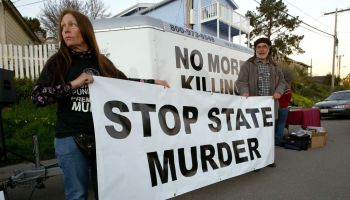GAZA CITY, Gaza Strip — Militants in Hamas-ruled Gaza agreed Sunday to a weeklong cease-fire with Israel, after three weeks of violence that Palestinian medics say has killed more than 1,000 people and turned Gaza’s streets into battlegrounds.
Sunday’s announcement came about 12 hours after Israel declared its own unilateral ceasefire.
Hamas’ Syrian-based deputy leader, speaking for the militant Palestinian factions, said on Syrian television that the cease-fire will give Israel time to withdraw and open all the border crossings to allow humanitarian aid into Gaza.
An Israeli security chief told Cabinet ministers the military operation “is not over” and that the next few days would be critical to determining whether it would resume.
The military said no one was injured by more than a dozen militant rockets that struck southern Israel ahead of the announcement from deputy Hamas leader Moussa Abu Marzouk on Syrian television.
“We the Palestinian resistance factions declare a cease-fire from our side in Gaza and we confirm our stance that the enemy’s troops must withdraw from Gaza within a week,” Abou Marzouk said.
Israeli government spokesman Mark Regev would not say what level of violence would provoke Israel to call off the cease-fire.
“Israel’s decision allows it to respond and renew fire at our enemies, the different terror organizations in the Gaza Strip, as long as they continue attacking,” Israeli Prime Minister Ehud Olmert said at the start of the weekly Cabinet session.
“This morning some of them continued their fire, provoking what we had warned of,” Olmert said. “This cease-fire is fragile and we must examine it minute by minute, hour by hour.”
In Gaza, people loaded vans and donkey carts with mattresses and began venturing back to their homes to see what was left standing after the punishing air and ground assault the tiny seaside territory endured. Bulldozers began shoving aside rubble in Gaza City, the territory’s biggest population center, to clear a path for cars while medical workers sifting through mounds of concrete said they discovered 75 bodies. discovered dozens of bodies in the debris.
The Israeli cease-fire went into effect at 2 a.m. Sunday local time after three weeks of fighting that killed some 1,200 Palestinians, about half of them civilians, according to Palestinian and United Nations officials. At least 13 Israelis also died, according to the government.
An official who attended the Israeli Cabinet meeting quoted internal security service chief Yuval Diskin as telling ministers that “the operation is not over.”
“The next few days will make clear if we are heading toward a cease-fire or the renewal of fighting,” security chief Yuval Diskin was quoted as saying. The official spoke on condition of anonymity because Cabinet meetings are closed.
Israel stopped its offensive before reaching a long-term solution to the problem of arms smuggling into Gaza, one of the war’s declared aims. And Israel’s insistence on keeping soldiers in Gaza raised the prospect of a stalemate with the territory’s rulers.
The cease-fire went into effect just days ahead of President-elect Barack Obama’s inauguration Tuesday. Outgoing Secretary of State Condoleezza Rice said the Bush administration welcomed Israel’s decision and a summit set for later Sunday in Egypt is meant to give international backing to the truce.
Leaders of Germany, France, Spain, Britain, Italy, Turkey and the Czech Republic – which holds the rotating European Union presidency – are expected to attend along with Palestinian President Mahmoud Abbas, Egyptian President Hosni Mubarak and U.N. chief Ban Ki-moon.
Ban welcomed the cease-fire. “Urgent humanitarian access for the people of Gaza is the immediate priority,” he said, declaring that “the United Nations is ready to act.”
Israel said it was not sending a representative to the meeting. Hamas, shunned internationally as a terrorist organization, was not invited. However, the group has been mediating with Egypt and any arrangement to open Gaza’s blockaded borders for trade would likely need Hamas’ acquiescence.
In announcing the truce late Saturday, Prime Minister Ehud Olmert said Israel would withhold fire after achieving its goals and more.
“Hamas was hit hard, in its military arms and in its government institutions. Its leaders are in hiding and many of its men have been killed,” Olmert said.
If Hamas holds its fire, the military “will weigh pulling out of Gaza at a time that befits us,” Olmert said. If not, Israel “will continue to act to defend our residents.”
In Gaza, people began to take stock of the devastation. The Shahadeh family loaded mattresses into the trunk of a car in Gaza City, preparing to return to their home in the hard-hit northern Gaza town of Beit Lahiya.
“I’ve been told that the devils have left,” said Riyadh Shahadeh, referring to the Israelis. “I’m going back to see how I’m going to start again. I don’t know what happened to my house. … I am going back there with a heart full of fear because I am not sure if the area is secure or not, but I have no other option.”
In the southern town of Rafah, where Israel bombed dozens of smuggling tunnels, construction worker Abdel Ibn-Taha said he was very happy about the truce. “We’re tired out,” he said.
Schools in southern Israel remained closed in anticipation of possible rocket fire. Shortly before the rocket volley Sunday, the head of the Parents Association in the border town of Sderot, Batya Katar, said she was disappointed that Israel did not reach an agreement directly with Hamas, which Israel shuns.
“It’s an offensive that ended without achieving its aims,” Katar said. “All the weapons went through Egypt. What’s happened there?”
Israel apparently reasons that the two-phase truce would give it ammunition against its international critics: Should Hamas continue to attack, then Israel would be able to resume its offensive after having tried to end it.
Hamas, which rejects Israel’s existence, violently seized control of Gaza in June 2007, provoking a harsh Israeli blockade that has deepened the destitution in the territory of 1.4 million Palestinians. The Israeli war did not loosen Hamas’ grip on Gaza.
















